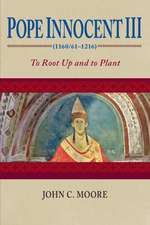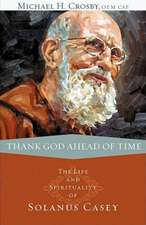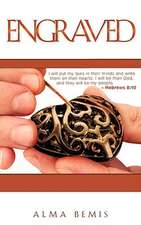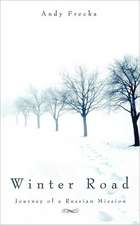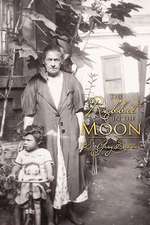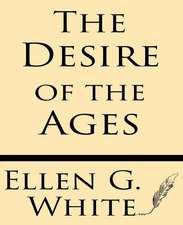Pio Nono
Autor E. E. y. Halesen Limba Engleză Paperback
By E.E.Y. Hales
Contents
Preface
I-The Liberal Pope and His Inheritance
--Mastai Feretti, Bishop, in Pope Gregory XVI's dominion
--The beginnings of Liberal-Catholicism
II-The Reforming Pope
--Pio Nono, political reformer
--The Pope becomes a constitutional monarch
--The war against Austria
--The murder of Rossi and flight of the Pope
III-The Revolution
--Mazzini and the dogma of the people
--The Roman Republic
IV-Peace and Reconstruction
--The restoration of two hierarchies and the immaculate conception
--Peaceful development in the Papal state
V-Turin versus Rome
--The religious aggression in Piedmont
--The War of 1859
--De Merode creates a volunteer army
--Castelfidardo
VI-Napoleon and Rome
--Cavour and Pio Nono
--Napoleon and Pio Nono
--The defence of the patrimony of St. Peter
VII-Pio Nono versus Liberalism
--The syllabus of errors
--The eclipse of Liberal-Catholicism: Montalembert, Dollinger, Acton, and Pio Nono
--From the syllabus to the Vatican Council
VIII-Triumph, Defeat, and Death
--The Vatican Council
--The prisoner in the Vatican
Preface
Why, since his death in 1878, has no study appeared in England of Pio Nono?
Perhaps because he was a Pope. Yet this seems insufficient answer since he was also a leading character--at first "the" leading character--in that drama so dear to Englishmen, the Italian Risorgimento. And even as Pope he forced himself upon the attention of Englishmen in his day by his "Papal Aggression" in restoring the Catholic Hierarchy to England, by issuing the Syllabus of Errors, by defining Papal Infallibility, by enraging both Gladstone and Exeter Hall by reigning longer than any Pope had ever reigned, by recruiting an international army, by losing the most ancient sovereignty of Europe--the Papal State.
In an important sense Pio Nono was the central figure of the mid-nineteenth century. But we name epochs after their political arbiters, we talk of Metternich's Europe, and Bismarck's Europe, so that the period between the flight of Metternich in 1848 and the foundation of the German Empire in 1870 becomes Napoleon III's Europe--or Pamerston's. If, with Shakespeare, we were to choose for our title the suffering tragic hero, the symbolic central character, then the middle of the century would be called the age of Pio Nono--for the same reasons as Shakespeare called his plays "King Lear" or "Othello," rather than Goneril or Iago. Those who were working for change, or for power, assailed the Pope's claims, and...
------------------------------------------------------------------------------------------------------------------------------------------
Windham Press is committed to bringing the lost cultural heritage of ages past into the 21st century through high-quality reproductions of original, classic printed works at affordable prices.
This book has been carefully crafted to utilize the original images of antique books rather than error-prone OCR text. This also preserves the work of the original typesetters of these classics, unknown craftsmen who laid out the text, often by hand, of each and every page you will read. Their subtle art involving judgment and interaction with the text is in many ways superior and more human than the mechanical methods utilized today, and gave each book a unique, hand-crafted feel in its text that connected the reader organically to the art of bindery and book-making.
We think these benefits are worth the occasional imperfection resulting from the age of these books at the time of scanning, and their vintage feel provides a connection to the past that goes beyond the mere words of the t
Preț: 134.04 lei
Nou
Puncte Express: 201
Preț estimativ în valută:
25.65€ • 26.68$ • 21.18£
25.65€ • 26.68$ • 21.18£
Carte disponibilă
Livrare economică 25 martie-08 aprilie
Preluare comenzi: 021 569.72.76
Specificații
ISBN-13: 9781628450897
ISBN-10: 1628450894
Pagini: 354
Dimensiuni: 152 x 229 x 19 mm
Greutate: 0.47 kg
Editura: Windham Press
ISBN-10: 1628450894
Pagini: 354
Dimensiuni: 152 x 229 x 19 mm
Greutate: 0.47 kg
Editura: Windham Press

